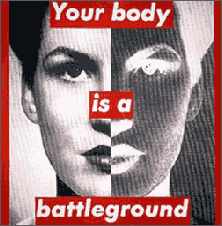Websites that Encourage Anorexia & Other Eating Disorders for Girls Popular ... and Controversial
by www.SixWise.com
Close to 5 percent of young women in the United States suffer
from eating disorders like anorexia, an obsession with being
thin to the point that you starve yourself and exercise excessively,
and bulimia, binging on large amounts of food and then purging
them from the system.
Boys and men are affected too, with research from Anorexia
Nervosa and Related Eating Disorders, Inc. suggesting that
5 percent to 10 percent of people with eating disorders are
male.
But a new trend has emerged that has many people up in arms:
pro-eating disorder Web sites, often run by young girls with
eating disorders themselves, have sprung up all over the Internet.
An estimated 500 sites already exist.
|

Many pro-anorexia sites use pictures like these for
"thinspiration."
|
"With the pressures to be thin in our culture, [these
Web sites are] like placing a loaded gun in the hands of someone
who is feeling suicidal," said Holly Hoff of the National
Eating Disorders Association in an Oprah.com article.
Much press has come to this issue due to a Time Magazine
article, "Starvation on the Web," that ran on July
18. The focus of the article is the pro-anorexia Web site
ceruleanbutterfly.com,
which is run by a 19-year-old college student with anorexia
who at one time weighed 88 pounds. She has since received
a host of hate mail ranging from lectures ... :
"Listen to yourself and try to make the least bit
sense of it, you sound SO pathetic. Its making me nauseous.
Compare yourselves to people in the third world countries
such as Sudan, Ethiopia, India etc. where innocent people
don't know if they're going to live another day considering
that they have nothing to eat, you should thank god that
you are in a far FAR better state than so many people in
this world."
... To all-out threats:
"Of course people are gonna hate you. You are PROMOTING
anorexia. Surely, people would respect you if you weren't.
oh, and when I find you... you're dead."
Pro-Ana and Pro-Mia
The pro-eating disorder sites already have their own slang
names: pro-ana (for pro-anorexia) and pro-mia (for pro-bulimia).
What exactly are these sites? They're gathering grounds for
people who have eating disorders like anorexia but "accept
anorexia in their lives and don't yet choose to recover,"
as a site called "Starving for Perfection" puts
it.
Some offer tips on how to be anorexic and bulimic, photos
of thin people for "thinspiration," foods to eat
that have few calories, how to "survive" eating
in a restaurant, and message boards and chat rooms for support.
There are even tips on how not to eat ("Save the money
you would have spent on that meal in a jar. Lunch cost $6.74?
Save it in a bottle instead and watch it grow," says
one site.)
The "Starving for Perfection" site also includes
these "Thin Commandments":
-
Being thin is more important than being healthy
-
You must buy clothes, cut your hair, take laxatives,
starve yourself, do anything to make yourself look thinner
-
Thou shall not eat without feeling guilty
-
Thou shall not eat fattening foods without punishing
oneself afterwards
-
Thou shall count calories and restrict intake accordingly
-
What the scale says is the most important thing
-
Losing weight is good/ Gaining weight is bad
-
You can never be too thin
-
Being thin and not eating are true signs of willpower
and success
Silent Cries for Help?
|

This picture is used on one pro-ana site "to inspire
not starvation, but confidence, activism, and creativity."
|
Although the sites' creators appear to accept the disorders,
some experts think the sites are cries for help.
"I think some of these sites are worded in a way that
indicates the hosts do want help," says Vivian Meehan,
president and founder of the National Association of Anorexia
Nervosa and Associated Disorders, or ANAD. "They're putting
themselves out there. But then they also put up a defense
against it. Don't come on the site if you're only interested
in putting us down."
Indeed. Upon visiting the Cerulean Butterfly site, the visitor
must go through three sets of disclaimers, answering "OK"
to each before being allowed to enter:
-
"This site contains pro-Eating Disorder images and
information. If you do not have an eating disorder or
are in recovery, do not enter this site."
-
"Seriously. You enter this site of your own volition,
and I am not responsible for the decisions you make based
on the information you see here."
-
"So don't send me hate mail. It's your fault if
you don't like what you see."
Will the Sites Continue?
While major Web hosters can choose to shut down Web sites
based on content that could be a danger to minors, many of
these pro-ana and pro-mia sites are now being privately hosted
so they can't be shut down. The sites are also more difficult
for recovery experts to locate.
As for how these sites could affect today's youth, Vivian
Meehan had this to say:
"One of the primary goals of anorexics is to persuade
others that they are perfectly fine, and that they have
the right to lead their lives however they see fit. And
one of the ways of doing that is to find other people who
are achieving those goals--so these Web sites provide ...
reinforcement, along with a forum for exchanging and picking
up tips."
Recommended Reading
How
to Talk to a Teenager (and Know That They're Listening)
Sources
Time
Magazine: Starvation on the Web
Time.com:
Anorexia Goes High Tech
Oprah.com:
Pro-Anorexia on the Web
The
Wave Magazine
GirlPower.gov